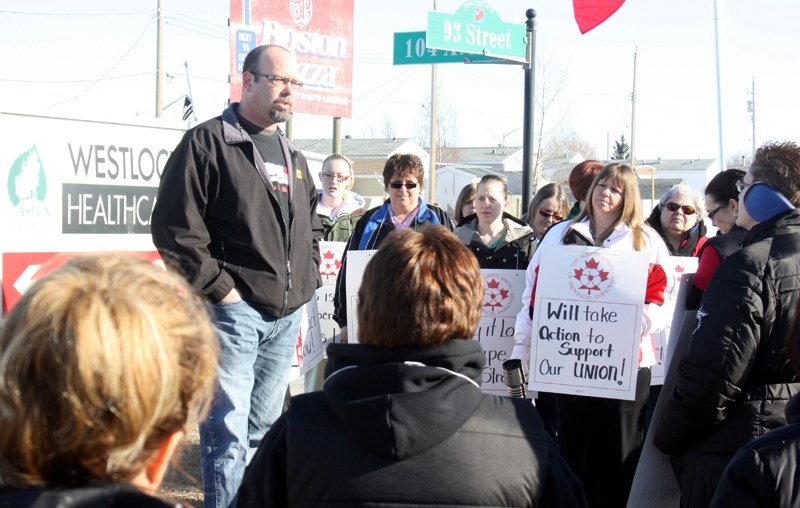Alberta Health Services and the union representing about 60 support staff who walked off the job at the Westlock hospital last week have agreed to binding arbitration.
Thursday’s demonstration began as an information picket scheduled for several locations across the province, and quickly became a wildcat strike at many of those locations — Westlock included.
“This will last until AHS comes back to negotiate,” said Erez Raz, a vice-president with the Alberta Union of Public Employees, which represents hospital support staff in the province.
The union and AHS agreed to binding arbitration on Thursday night, meaning an arbitrator will decide the details of a contract and both side will live with it.
Raz said that while no strike action had been planned as of Thursday morning, discontent with AHS’s attitude toward the bargaining process boiled over.
“They’ve been extremely disrespectful throughout the bargaining process. This issue isn’t as much about money as it is about respect,” he said. “(Workers) are fed up with the way this is going so they decided to walk off the job.”
An AHS spokesperson could not be reached for comment last week, so it is unknown if the job action had any effect on patient care in Westlock.
The board was quick to condemn the wildcat strikes in a press release issued early Thursday afternoon. In it, one of the board’s executive vice-presidents said any labour activity that affects patient care is “unreasonable” and said union members rejected an offer of pay increases — what amounts to about a two-per-cent increase for three years.
Lynne Hansen, a union member from Mayerthorpe who was part of the negotiating team, said the offer of an increase is misleading, since the health superboard is also seeking to eliminate a process called red circling.
When the provincial board took over for regional boards, many different jobs were reclassified under different titles with different, and sometimes lower pay scales. If an employee is red circled, it means they continue to make their current rate until the pay scale catches up to what they’re making.
If AHS removes red circling, it would actually mean a pay cut for some of the union members.
For example, Hansen said, it could mean a wage decrease from about $16 to about $14 per hour for laundry staff and dietary staff. Any increase would be on the lower wage, which would still amount to a pay cut.
In addition, she said issues of working hours and scheduling are on the forefront of workers’ minds.
She also noted that while workers on the front lines are being asked to take pay cuts or very small pay increases, since AHS took over operations there has been a 30 per cent increase in upper management salaries, with some of those manager being paid hundreds of dollars per hour.
“The health increase the government tells us we’re getting isn’t reaching the people that do the cleaning and the food serving and the maintenance of the hospital. It’s going to upper management.”
Westlock-area workers were unwilling to make any comments on the record, citing fear of retribution from AHS. The board’s policy with respect to media is that all requests must go through the communications department and no workers are to speak to media without authorization. This applies to all staff, including doctors.
One worker spoke with the Westlock News on condition of anonymity, said the policy not to speak with media was as much of a problem as anything else, and speaks to the inefficiency of the system.
“The corporation insists on having control over every facet of the organization, and that right there doubles our workload,” he said. “We have all the same people in the offices, but now an enormous structure watches over us.”

